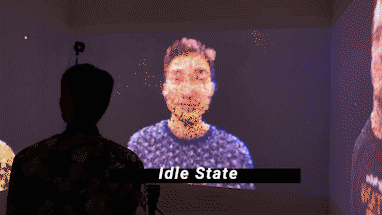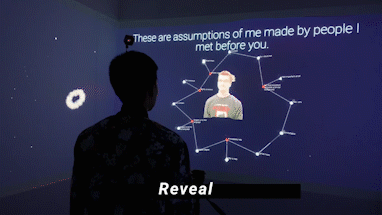Kaleidoscope (2018)
Role: Designer / Programmer / Artist
Duration: 15 weeks
Platform: HTC Vive / 3-Wall Projection
Tools: Unity / Intel Realsense Depth Camera
Contributions
-
Main designer for overall experience and concept
-
Interaction design and data visualisation
-
Aesthetic of overall experience
-
Mechanics and main systems
An interactive installation exploring culture, identity, and bias through emerging technologies, to encourage reflection on how implicit bias shapes our perceptions of others and additionally spark conversation about how these assumptions are not always representative of the truth.
Kaleidoscope makes use of a 3-wall projector set-up and the HTC Vive controllers to create an immersive space that includes observers as part of a joint experience on cultural competence. An Intel Realsense camera is used to capture the likeness of guests, and the depth capture allowed us to manipulate their digital identity and present that as part of the experience to create a sense of intimacy.
The main goal of the experience was to stir conversation and introspection without explicitly telling guests how and what to feel. To that end, Kaleidoscope presents guests with a stranger, prompting them to answer several questions punctuated by the stranger engaging in dialogue about themselves—much akin to the process of meeting someone new.
At the end of the experience, the truth of the stranger is juxtaposed against the answers given by the guest. The guest is then given the option of consenting to have their likeness recorded by the Realsense camera, and answer the same set of questions to be used as part of the experience. This incorporation of guests was a crucial part of the design consideration, and the blurring of the distinction between guest and stranger created a wonderful opportunity for conversation and self-reflection.
Kaleidoscope is currently installed within the Askwith Kenner Global Languages and Cultures Room located in the new Tepper Quad at Carnegie Mellon University and was developed for our clients Stephan Caspar, Assistant Teaching Professor of Media Creation & Multi-Cultural Studies, and Sébastien Dubreil, Teaching Professor of French and Francophone Studies, Second Language Acquisition and Technology-Enhanced Learning, at Carnegie Mellon University.



